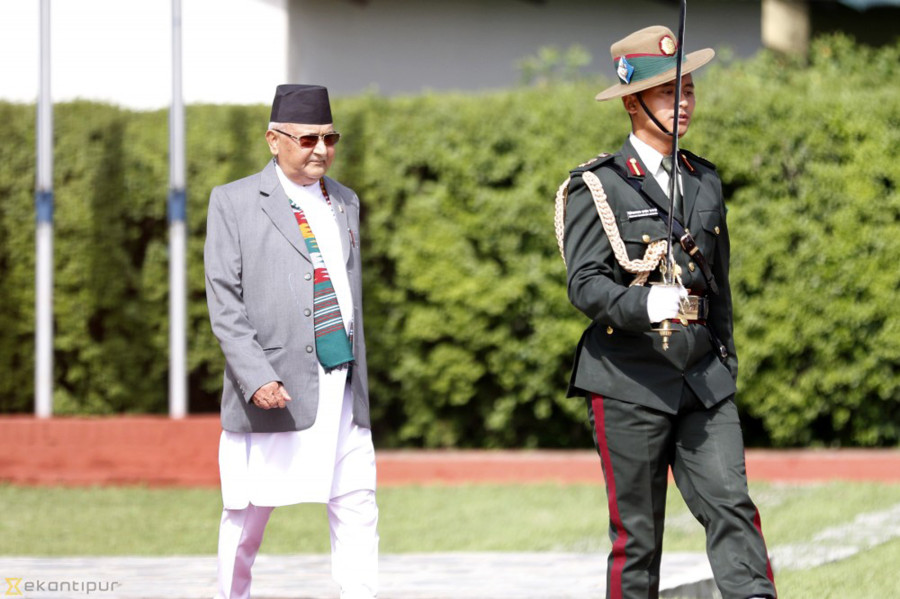Politics
For the first time, ruling party lawmakers criticise Oli administration’s foreign policy
Party MPs pointed to the failure of Oli’s recent Europe tour and censured the foreign ministry’s lack of direction
Anil Giri
Days after Prime Minister KP Sharma Oli returned from a week-long trip to Europe, lawmakers from both the ruling and opposition parties have criticised his administration’s handling of foreign policy.
Speaking at a regular session of the House while deliberating on the budget allocated to the Ministry of Foreign Affairs, ruling party lawmakers questioned the “independence and efficacy” of the Oli administration’s foreign policy conduct.
“We talk about non-alignment, but sometimes we tilt south and at other times, we tilt north,” said Janardan Sharma, a senior ruling party leader. “Sometimes, we are even running towards the west. This shows that we are not conducting our diplomacy as per the principle of non-alignment.”
Sharma, a former home minister, went on to question the role of Nepal’s embassies abroad, in the wake of Oli’s failure to meet with any heads of state during his Europe tour.
“What are our missions doing? What are our ambassadors doing and what will our four new ambassadors do?” asked Sharma, questioning their qualifications for being appointed as ambassador.
The criticism, a first for lawmakers from the ruling party, comes amid widespread censure of Oli’s recent visit to three European nations with no tangible results.
Lawmakers also raised concerns over the actions and statements of various foreign ambassadors and officials.
Sharma pointed to a June 5 statement made by Australian Ambassador to Nepal Peter Budd, who said Nepali leaders could face arrest abroad if the outstanding issues of transitional justice were not resolved.
“We’ve learned that several ambassadors are commenting on Nepal’s peace process, but what is the foreign ministry doing?” said Sharma.
Dev Gurung, chief whip of the ruling Nepal Communist Party (NCP), seconded Sharma, saying that some “forces” were attempting to turn Nepal into a battleground of foreign actors.
“The Americans are coming every month to Kathmandu and saying that Nepal is very much a part of the Indo-Pacific Strategy. But the government is not refuting them,” said Gurung. “The foreign ministry should take firm action and stand against the Indo-Pacific Strategy.”
Nepal’s primary challenge is to counter the danger emanating from the Indo-Pacific Strategy, which is directed at countering China, Gurung later told the Post.
During Foreign Minister Pradeep Gyawali’s visit to the United States in December last year, Washington had sought “Nepal’s central role in free and open Indo-Pacific”. US officials who visited Nepal, however, have said that the strategy is not against any country.
“We need a clear answer from the government. We should not be involved in any military alliance,” said Gurung.
Other ruling party leaders criticised the Foreign Ministry for working like an arm of the Prime Minister’s Office, instead of an independent entity.
“The foreign ministry looks like a shadow office of the Prime Minister’s Office,” said ruling party leader Pampha Bhusal.
In the same session, lawmakers from the opposition Nepali Congress also seized upon the Oli government’s foreign policy, seconding and elaborating on the ruling party’s criticisms.
“We need a towering figure at the foreign ministry to engage with foreigners,” said Narayan Khadka, who is the shadow foreign minister from the Nepali Congress. “We need someone who can talk and hold dialogue with foreigners. At one time, the late BP Koirala was a towering personality.”
Khadka further bemoaned the lack of preparations on the part of the foreign ministry to deal with emerging geopolitical risks.
“Not a single penny has been allocated to the foreign ministry to hold seminars and conferences,” he said. “What will happen if a war breaks out in the Gulf?”
Oli’s aides and the foreign ministry have portrayed the country’s foreign policy as attempting to look beyond the India-China paradigm and seek “strategic autonomy”, which is why the prime minister is visiting several countries besides Nepal’s immediate neighbourhood.
Since being appointed prime minister last year, Oli has visited numerous countries, including Costa Rica, Mongolia and Cambodia, apart from his recent visit to the United Kingdom, France and Switzerland. His globetrotting has cost the state millions of rupees while simultaneously inviting controversy for their lack of tangible outcome.
According to figures from the finance ministry, Oli spent Rs 11.81 million travelling to Davos, Switzerland to attend the World Economic Forum in January.
The combined cost of Oli’s trip to Mongolia and Cambodia was Rs 21.28 million while the Nepali delegation’s visit to the United Nations and Costa Rica in September last year cost the state Rs 40.37 million. The bills from his most recent European trip have yet to be submitted, said the finance ministry.
Oli spent Rs 19.3 million on a trip to China and Rs 10.3 million for visiting India.




 14.24°C Kathmandu
14.24°C Kathmandu














